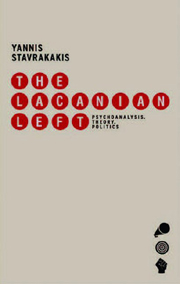Book contents
- Frontmatter
- Contents
- Bibliographical Note
- Acknowledgements
- Dedication
- Introduction: Locating the Lacanian Left
- PART I Theory: Dialectics of Disavowal
- PART II Analysis: Dialectics of Enjoyment
- 4 What Sticks? From Symbolic Power to Jouissance
- 5 Enjoying the Nation: A Success Story?
- 6 Lack of Passion: European Identity Revisited
- 7 The Consumerist ‘Politics of Jouissance’ and the Fantasy of Advertising
- 8 Democracy in Post-Democratic Times
- Bibliography
- Index
5 - Enjoying the Nation: A Success Story?
from PART II - Analysis: Dialectics of Enjoyment
Published online by Cambridge University Press: 12 September 2012
- Frontmatter
- Contents
- Bibliographical Note
- Acknowledgements
- Dedication
- Introduction: Locating the Lacanian Left
- PART I Theory: Dialectics of Disavowal
- PART II Analysis: Dialectics of Enjoyment
- 4 What Sticks? From Symbolic Power to Jouissance
- 5 Enjoying the Nation: A Success Story?
- 6 Lack of Passion: European Identity Revisited
- 7 The Consumerist ‘Politics of Jouissance’ and the Fantasy of Advertising
- 8 Democracy in Post-Democratic Times
- Bibliography
- Index
Summary
As a matter of fact, the modern idea of the nation is not even on the horizon of classical thought, and it is not merely the fortunes of a word that demonstrate this to us.
Jacques LacanAll that is elaborated by the subjective construction on the scale of the signifier in its relation to the Other and which has its root in language is only there to permit the full spectrum of desire to allow us to approach, to test, this sort of forbidden jouissance which is the only valuable meaning that is offered to our life.
Jacques LacanApproaching the nation
Although our contemporary world is marked throughout by the importance of questions of identity, something increasingly reflected in the directions of contemporary social–scientific research, in the general field of nationalism studies the issue of the attraction and salience of national identities has not been sufficiently examined. This is partly due to the hegemonic position of modernist and constructionist approaches in the relevant literature. In opposition to the common doxa reproduced by nationalist myths, contemporary research on the nation tends to stress the constructed character of national identity: the nation is primarily understood as a modern social and political construction. Thus, more emphasis is placed on the production of nationalism under specific historical conditions than on its reproduction, that is, on the remarkable continuity marking the identification with nations – a continuity observed in various geographical, social and historical milieus.
- Type
- Chapter
- Information
- The Lacanian LeftPsychoanalysis Theory Politics, pp. 189 - 210Publisher: Edinburgh University PressPrint publication year: 2007



